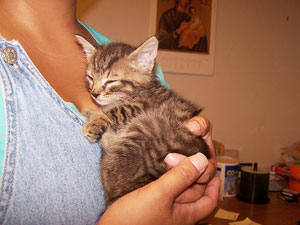 * Be aware of the plants you have in your house and in your yard, if your cat is permitted outside (CFA advocates cats being kept indoors at all times). The ingestion of azalea, oleander, easter lily, or yew plant material by a cat could be fatal.
* Be aware of the plants you have in your house and in your yard, if your cat is permitted outside (CFA advocates cats being kept indoors at all times). The ingestion of azalea, oleander, easter lily, or yew plant material by a cat could be fatal.* When cleaning your house, never allow your cat access to the area where cleaning agents are used or stored. Cleaning agents have a variety of properties; from those that could just irritate the gastrointestinal tract to those that have a corrosive action and can chemically burn the sensitive mucous membranes of the mouth, esophagus, and stomach.
* When using rat or mouse baits, ant or roach traps, or snail and slug baits, place the products in areas that are inaccessible to your cats. Most baits contain sweet smelling inert ingredients, which can be very attractive to your cat.
* Never give your cat any medications unless under the directions of veterinarian. Many medications that are used safely in humans can be deadly when used inappropriately. One extra strength acetaminophen tablet (500mg) can kill a 7 pound cat.
* Keep all prescription and over the counter drugs out of reach of your cats. Pain killers, cold medicines, anti-cancer drugs, antidepressants, and diet pills are common examples of human medication that could be potentially lethal even in small dosages. Only one half of a 200mg naproxen tablet could cause stomach ulcers in cats.
* Never leave chocolates unattended. Approximately one half ounce of baking chocolate per pound body weight or less can cause clinical signs of toxicity.
* Many common household items have been shown to be lethal in certain species, including felines. Miscellaneous items that are highly toxic even in low quantities include pennies (high concentration of zinc), mothballs (contain naphthalene or paradichlorobenzene - one or two balls can be life threatening in most species), potpourri oils, fabric softener sheets, automatic dish detergents (contain cationic detergents which could cause corrosive lesions), batteries (contain acids or alkali which can also cause corrosive lesions), homemade play dough (contains high quantity of salt), winter heat source agents like hand or foot warmers (contain high levels of iron), cigarettes, coffee grounds, and alcoholic drinks.
* All automotive products such as oil, gasoline, and antifreeze should be stored in areas away from cat access. As little as one teaspoon of antifreeze (ethylene glycol) can be deadly in a 7lb cat.
* Before buying or using flea products on your cat or in your household, contact your veterinarian to discuss what types of flea products she/he would recommend for your pet. Read ALL information before using a product on your cat or in your home. Always follow label instructions. When a product is labeled "for use in dogs only" this means that the product should NEVER be applied to cats. When using a fogger or a house spray, make sure to remove all cats from the area for the time period specified on the container.
* When treating your lawn or garden with fertilizers, herbicides, or insecticides, always keep your cats away from the area until the area dries completely. Discuss usage of products with the manufacturer of the products to be used. Always store such products in an area that will ensure no cat exposure.






No comments:
Post a Comment